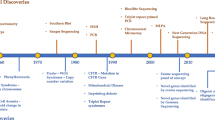Abstract
Inherited metabolic diseases have changed from a limited group of rare, untreatable, often fatal disorders to an important cause of acutely life-threatening and increasingly treatable diseases. Unchanged is the orphan nature of these disorders. In 1999 the World Health Organization (WHO) declared rare or orphan diseases as a major future health challenge followed by similar initiatives of the European Union. The prevalence was defined as less than four people affected per 10,000 people in the USA and less than five people per 10,000 in the European Union. Fortunately this difference does not hamper initiatives to develop worldwide. It has now become well established that rare diseases, including inherited metabolic diseases, are life-threatening or chronically debilitating diseases which such low prevalences that special combined and coordinated efforts are needed to address them. The aim is to tackle the severe reduction in an affected individual’s quality of life and socioeconomic potential and ideally finally to prevent significant early mortality and morbidity. It is estimated that between 8,000 and 10,000 distinct rare diseases exist today, affecting between 6 and 8 % of the population in total, i.e., between 27 and 36 million people in the European Union. Most of the people represented by these statistics even suffer from very rare diseases affecting one in 100,000 people or less. In 2006 the March of Dimes Birth Defects Foundation issued the first comprehensive global report on an important subset of rare diseases, genetic birth defects, showing incidences in the range of 40–80 per 1,000 live births worldwide. Challenges of rare diseases are especially high in inbred communities, determined by geographical, ethnical, or religious boundaries, e.g., isolated territories, Jewish communities, or Arabic countries. In the latter many local tribes were originally isolated until the beginning of the twentieth century, and, up to now, it is common to marry a first- or second-degree cousin. Resulting founder effects are responsible for a much higher prevalence of inherited diseases.
Access this chapter
Tax calculation will be finalised at checkout
Purchases are for personal use only
Similar content being viewed by others
References
Christianson A, Howson CP, Modell B (2006) Global report on birth defects. March of Dimes Birth Defects Foundation, White Plains. marchofdimes.com/globalprograms
EU Council Recommendation on an action in the field of rare diseases. 8th Jun 2009. http://eur-lex.europa.eu/LexUriServ/LexUriServ.do?uri=OJ:C:2009:151:0007:0010:EN:PDF
Perrin JM, Knapp AA, Browning MF et al (2010) An evidence development process for newborn screening. Genet Med 12:131–134
Author information
Authors and Affiliations
Corresponding author
Editor information
Editors and Affiliations
Rights and permissions
Copyright information
© 2017 Springer-Verlag Berlin Heidelberg
About this chapter
Cite this chapter
Hoffmann, G.F. (2017). Inherited Metabolic Diseases in the Context of Rare/Orphan Diseases. In: Hoffmann, G., Zschocke, J., Nyhan, W. (eds) Inherited Metabolic Diseases. Springer, Berlin, Heidelberg. https://doi.org/10.1007/978-3-662-49410-3_6
Download citation
DOI: https://doi.org/10.1007/978-3-662-49410-3_6
Published:
Publisher Name: Springer, Berlin, Heidelberg
Print ISBN: 978-3-662-49408-0
Online ISBN: 978-3-662-49410-3
eBook Packages: MedicineMedicine (R0)




